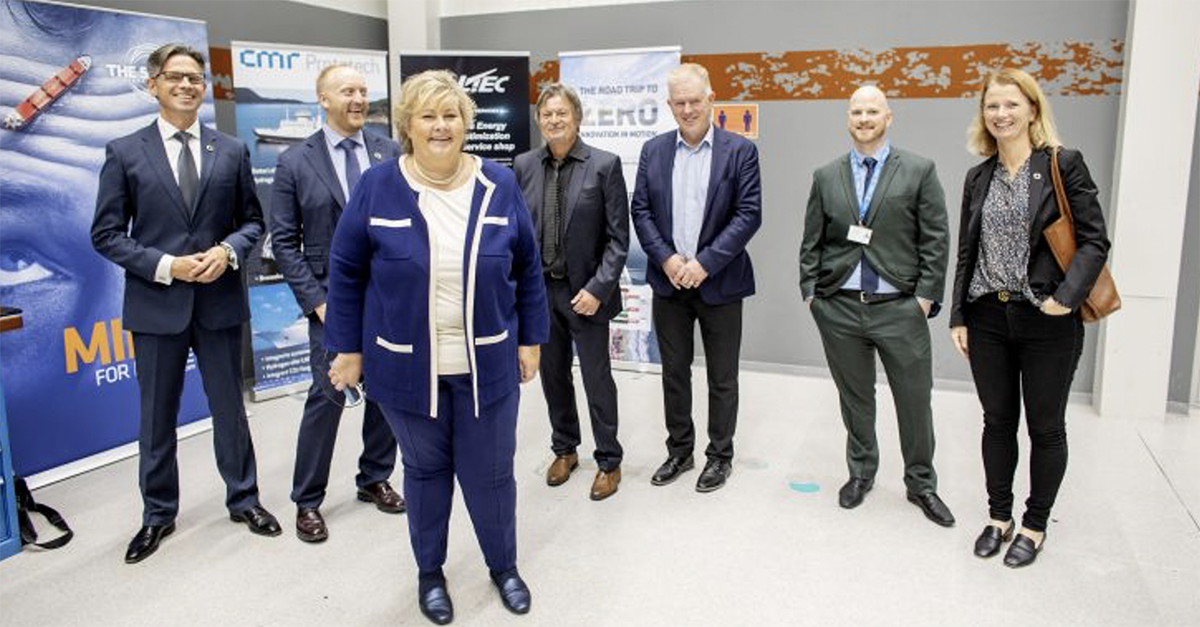Yaskawa Environmental Energy / The Switch is one of four companies in Norway to push green shipping forward by taking action in the Norwegian Catapult’s program to develop test centers.
On Thursday, October 1, Norway’s Prime Minister Erna Solberg visited the marine test center in Stord where The Switch Norway’s development roles has been key to learn more.
According to Paul Atherton, General Manager at The Switch Norway: “The marine industry needs to take action now to reach the goals of reducing greenhouse gas (GHG) by 50% compared to 2008 levels. One big open question is – what will be the fuel of the future? Nobody knows for sure.”
The existing fleet will be here for the next 25–30 years. And as Erik Hjortland, VP Technology of Odfjell, stated, “We don’t know what the fuel of tomorrow will be.” That is why it is important to find alternatives for today’s diesel or LNG. Which will be tested in the test center.
What is certain is that to achieve this goal, it is necessary to improve utilization and energy efficiency in combination with fuel decarbonization.
“Fuels are totally oil-dominated today,” Paul says. “In the future, we feel it will be a predominant mix of 60% low- and/or zero-carbon fuels and 30% natural gas of which most will be LNG.”
Low-carbon fuels include ammonia, hydrogen and other electro-fuels, such as e-methanol according to DNV GL’s Energy Transition Outlook 2020.
The new Norwegian test center offers an arena for big companies like Wärtsilä to test their systems. At the same time, it opens up opportunities for smaller companies to try out their prototype equipment on a large scale, which they normally wouldn’t have the means to do. This helps them shorten the timeline from a prototype to a finished product.
“It is interesting for us to have a key role in the test center because it offers an opportunity to be part of forward-oriented projects. This gives us direct insight into what solutions and trends are coming in the future,” Paul explains.
Fuel cells will have a bigger role in the maritime industry, and there will be a need for power electronics that can transfer the energy from a fuel cell to the vessels’ grid. Future vessels will be able to handle a mix of fuel, so they will have a mix of fuel cells and batteries. For that, power electronics are also needed.
“We also see that improvements in efficiency are needed,” Paul continues. “Our permanent magnet machines offer significantly higher efficiency compared to traditional solutions: With our test center, we have a window to identify new opportunities for implementing our technology.”
The test center is the cooperation of four companies: Future Energy Solutions, Prototech, Yaskawa Environmental Energy / The Switch and Alltec Services, which is the owner of the building. Sustainable Energy (SUSEN) will promote the test center as a part of the Norwegian Catapult arrangement.
Norwegian Catapult
Norwegian Catapult is a program that aims to contribute to the establishment and development of national test centers for the benefit of Norwegian business. At these centers, companies are able to test new technology and solutions so they can move from the concept stage to market much faster. The program is run by Siva in close collaboration with Innovation Norway and the Research Council of Norway and is funded by the Norwegian Ministry of Industry and Fisheries.
Read more here:
Building the world’s first test centre for green energy carriers
▸Fuel cell project develops ground-breaking fuel solution for ships and offshore
